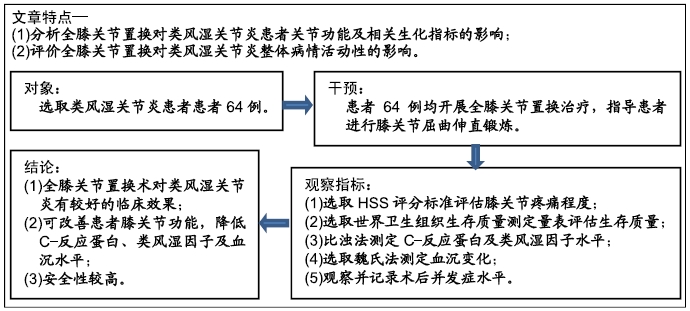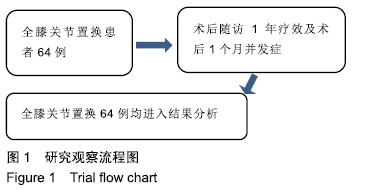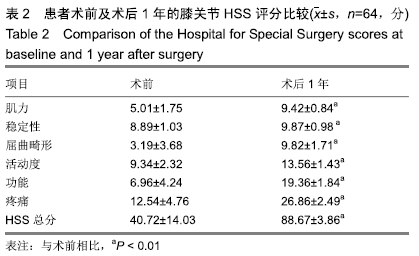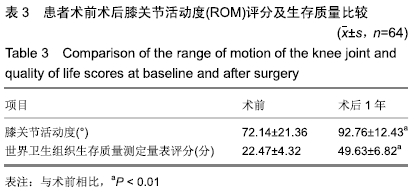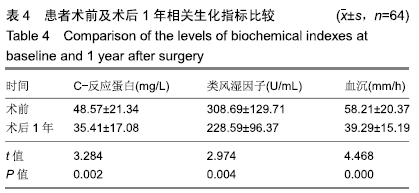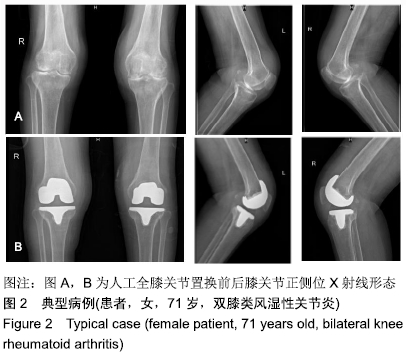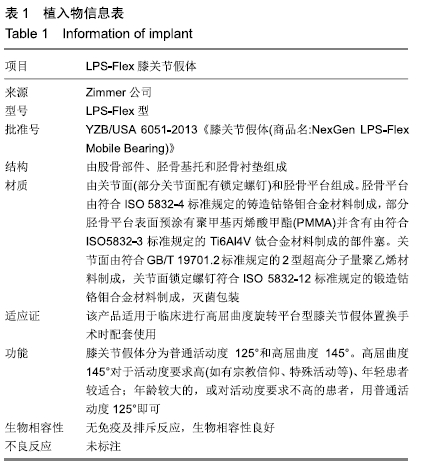[1] 栗占国.类风湿关节炎在我国的低认知度和高致残率不容忽视[J].中华医学杂志,2009,89(27):1873-1875.
[2] 解骏,肖涟波,徐岳林,等.88例患者106例膝类风湿性关节炎直视下膝关节滑膜切除术后15年随访资料的研究[J].生物医学工程研究,2012,31(3):201-204.
[3] 白跃宏.人工全膝关节置换一体化治疗及重要性[J].中国矫形外科杂志,2013,21(2):181-183.
[4] 谭美云,范忠伟,吴天昊,等.后稳定型假体结合Wihteside与Ranawat软组织松解在膝外翻畸形全膝关节置换中的应用[J].中国组织工程研究,2018,65(3):4926-4930.
[5] MADSEN SG, DANNESKIOLD-SAMSØE B, STOCKMARR A, et al. Correlations between fatigue and disease duration, disease activity, and pain in patients with rheumatoid arthritis: a systematic review. Scand J Rheumatol. 2016;45(4): 255-261.
[6] DE HAIR MJ, HARTY LC, GERLAG DM, et al. Synovial tissue analysis for the discovery of diagnostic and prognostic biomarkers in patients with early arthritis. J Rheumatol. 2011; 38(9):2068-2072.
[7] BOERS M, BUTTGEREIT F. A simple model that suggests possible cost savings when modified-release prednisone 5 mg/day is added to current treatment in patients with active rheumatoid arthritis. Rheumatology. 2013;52(8):1435-1437.
[8] KOOPMAN FA, STOOF SP, STRAUB RH, et al. Restoring the balance of the autonomic nervous system as an innovative approach to the treatment of rheumatoid arthritis. Mol Med. 2011;17(9-10):937-948.
[9] IBRAHIM IK, MEDANI SH, EL-HAMEED MMA, et al. Tarsal tunnel syndrome in patients with rheumatoid arthritis, electrophysiological and ultrasound study. Alexand J Med. 2013;49(2):95-104.
[10] RISTI GG, VESNA S, TOPLICA L, et al. Subclinical atherosclerosis in patients with rheumatoid arthritis and low cardiovascular risk: the role of von willebrand factor activity. PLoS One. 2015;10(8):e0130462.
[11] GOODMAN SM. Rheumatoid arthritis: preoperative evaluation for total hip and total knee replacement surgery. J Clin Rheumatol. 2013;19(4):187-192.
[12] JOHNSON BK, GOODMAN SM, ALEXIADES MM, et al. Patterns and associated risk of perioperative use of anti-tumor necrosis factor in patients with rheumatoid arthritis undergoing total knee replacement. J Rheumatol. 2013;40(5): 617-623.
[13] PANTOS PG, TZIOUFAS AG, PANAGIOTAKOS DB, et al. Demographics, clinical characteristics and predictive factors for total knee or hip replacement in patients with rheumatoid arthritis in Greece. Clin Exp Rheumatol. 2013;31(2):195.
[14] 符浩.用全膝关节置换治疗膝关节类风湿性关节炎的效果探究[J].当代医药论丛,2018,16(7):100-101.
[15] SOKKA T, PINCUS T. Erythrocyte sedimentation Rate, C-reactive protein, or rheumatoid factor are normal at presentation in 35%-45% of patients with rheumatoid arthritis seen between 1980 and 2004: analyses from finland and the United States. J Rheumatol. 2009;36(7):1387-1390.
[16] HSIN-HUA C, NICOLE H, YI-MING C, et al. Association between a history of periodontitis and the risk of rheumatoid arthritis: a nationwide, population-based, case-control study. Ann Rheum Dis. 2013;72(7):1206-1211.
[17] 李龙杰,张磊,张海森,等.类风湿关节炎全膝关节置换中髌下脂肪垫切除与否的对比研究[J].重庆医学,2019,26(8):1-6.
[18] 赵晓艳,陈迈.全膝关节置换治疗类风湿关节炎术后生化指标的变化及其早期疗效的研究[J].临床医药文献电子杂志,2019, 6(11):71-72.
[19] 胡兆洋,冉学军,覃勇志,等.全膝关节置换治疗膝关节骨性关节炎与类风湿关节炎的疗效比较[J].中国骨与关节损伤杂志,2018, 33(12):1295-1296.
[20] 张刚,吴雅迪.类风湿关节炎膝关节畸形对踝关节影响的138例临床报告[J].双足与保健,2018,27(19):3-4.
[21] 尹东,黄斐,高维陆,等.类风湿关节炎与骨关节炎全膝关节置换术后并发症比较[J].安徽医药,2018,22(7):1328-1330.
[22] 丁盛,张建坡,徐岳林,等.膝关节置换治疗老年类风湿性膝关节炎疗效分析[J].中国医学前沿杂志(电子版),2018,10(4):98-101.
[23] 吴秋季,马利平,刘芳,等.三间室膝关节置换治疗老年类风湿膝关节炎的效果[J].中国老年学杂志,2017,37(17):4333-4335.
[24] 马迎辉,厉志,翟伟韬,等.自拟中药熏蒸对重度类风湿膝关节炎人工膝关节置换后患者康复疗效及高凝状态和血清炎性因子的影响[J].现代中西医结合杂志,2017,26(36):4084-4087.
[25] 张巍,林剑浩.人工关节置换治疗类风湿关节炎[J].协和医学杂志, 2017,8(Z2):221-228.
[26] 贾敏,赵潇枫.人工全膝关节置换治疗严重类风湿性关节炎体会[J].世界最新医学信息文摘,2017,17(74):147-149.
[27] 徐鸿尧,赵建宁,包倪荣.人工膝关节置换对严重骨关节炎及类风湿性关节炎引起的膝关节畸形的疗效比较和术后风险评估[J].中国矫形外科杂志,2015,23(3):211-214.
[28] 程金生,李俊霞,周静.类风湿关节炎和骨关节炎患者膝关节置换后并发症的临床对照研究[J].湖南师范大学学报(医学版), 2017, 14(4):85-87.
[29] 刘军,甄平,周胜虎,等.高屈曲假体加延长杆在晚期类风湿关节炎伴重度膝外翻畸形和严重骨质疏松患者中的临床疗效研究[J].中国全科医学,2017,20(23):2852-2857.
[30] 王富强,张晋,张兆卿.氨甲环酸对类风湿关节炎患者全膝关节置换后失血量的影响[J].广西医科大学学报,2017,34(5):765-768.
[31] 高华利,肖涟波,翟伟韬,等.多模式镇痛与静脉自控镇痛对类风湿关节炎全膝关节置换围手术期镇痛效果的病例对照研究[J].中国骨伤,2017,30(4):356-359.
|
